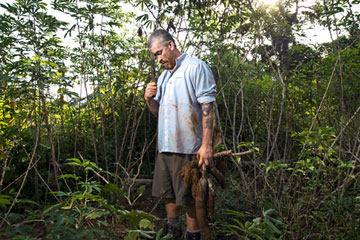
In the rain forest outside So Paulo, Atala harvests the tuber manioc.
(4 of 4)
Atala isn't influencing only his fellow Brazilians. He burst into the consciousness of world chefs with a presentation at the first MAD symposium--a two-day conference for chefs, held in Copenhagen--in 2011. He handed out small cubes of gelatin, each containing a single ant, and urged the audience to pop them in their mouths. A murmur went through the gathered 300, first of nervousness and then of relieved surprise. "It tastes like lemongrass, right?" he asked, before explaining that in the Amazon, ants are also considered an important seasoning. "We eat an ant and say, 'Oh, it tastes like lemongrass.' But you give lemongrass to the Baniwa, and they say, 'Oh, it tastes like ants.'"
Like Peter Parker, Atala still sometimes seems uncertain of his own power. At this year's MAD, he spoke about the death that lies behind every act of eating. To make his point, he brought a live chicken onstage and asked whether he should kill it. He expected ambivalence and in fact had a farmer waiting to take the bird home should the group spare its life. Instead the response looked and sounded disturbingly like bloodlust. He broke the bird's neck smoothly and cooked and served it at a party that night, but remained discomfited. "I wanted everyone to feel a stake in the bird's death, which is why I asked the audience to vote," he says. "But I was a bit troubled by how insistent they were."
Mostly, though, Atala is a man at peace. He still rocks out to the Ramones and Stiff Little Fingers, and his favorite photographic pose includes a raised middle finger. But these days he rolls up his sleeves in the kitchen and wears his ever expanding map of tattoos, including two of Baniwa deities, proudly. He has learned to channel his childhood energy and punk anger into his work protecting the people and ecologies of the Amazon.
Dried off after the jungle downpour and seated in a hammock overlooking the Rio Negro with a beer in his hand, he reflects on the day spent with the Baniwa women. "They're proof that food is the bridge between nature and culture," he says. "It took me a while to realize that, but I've been superhappy ever since I did. It gave me the power to unite my two worlds." Spoken like a true superhero.
